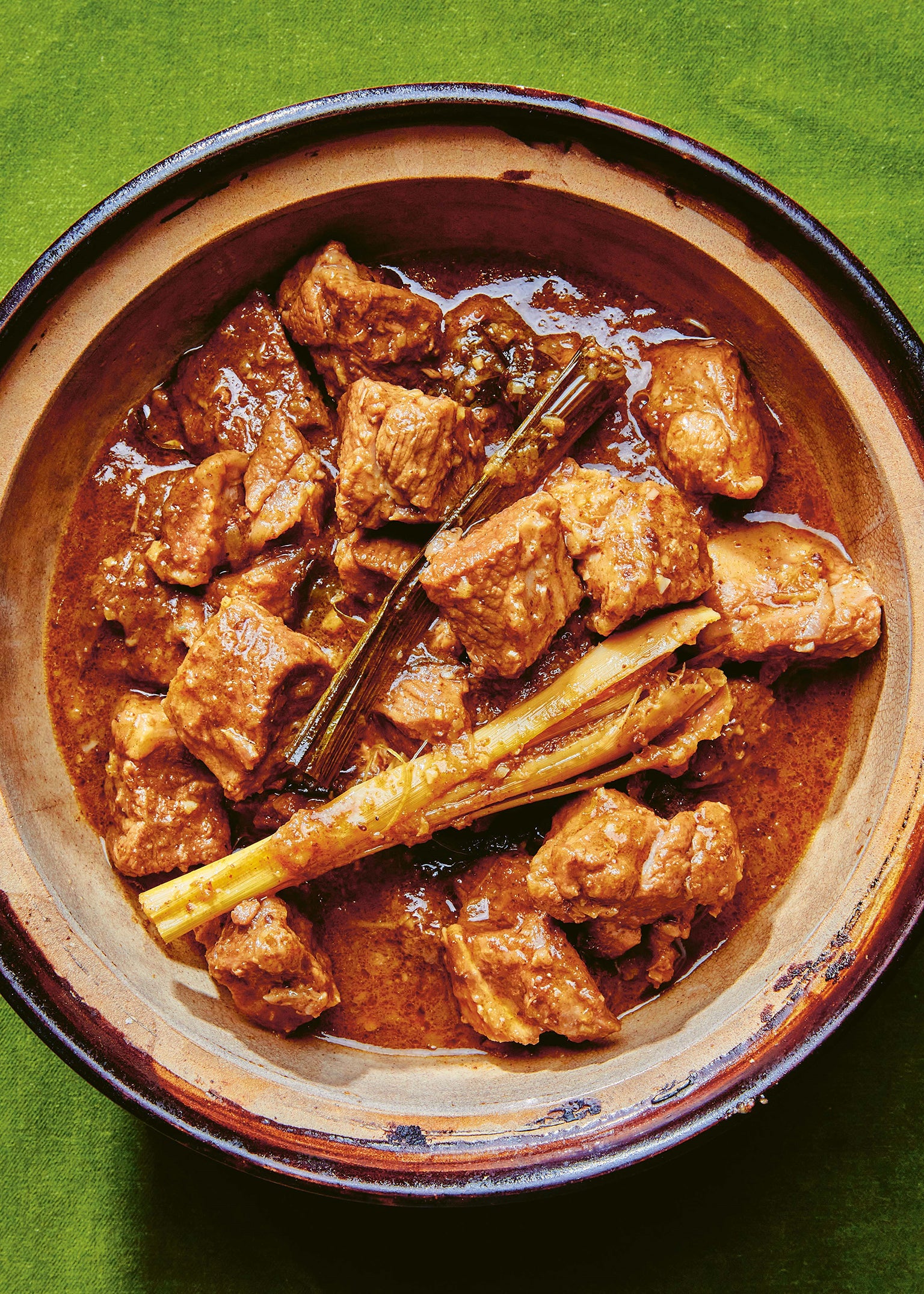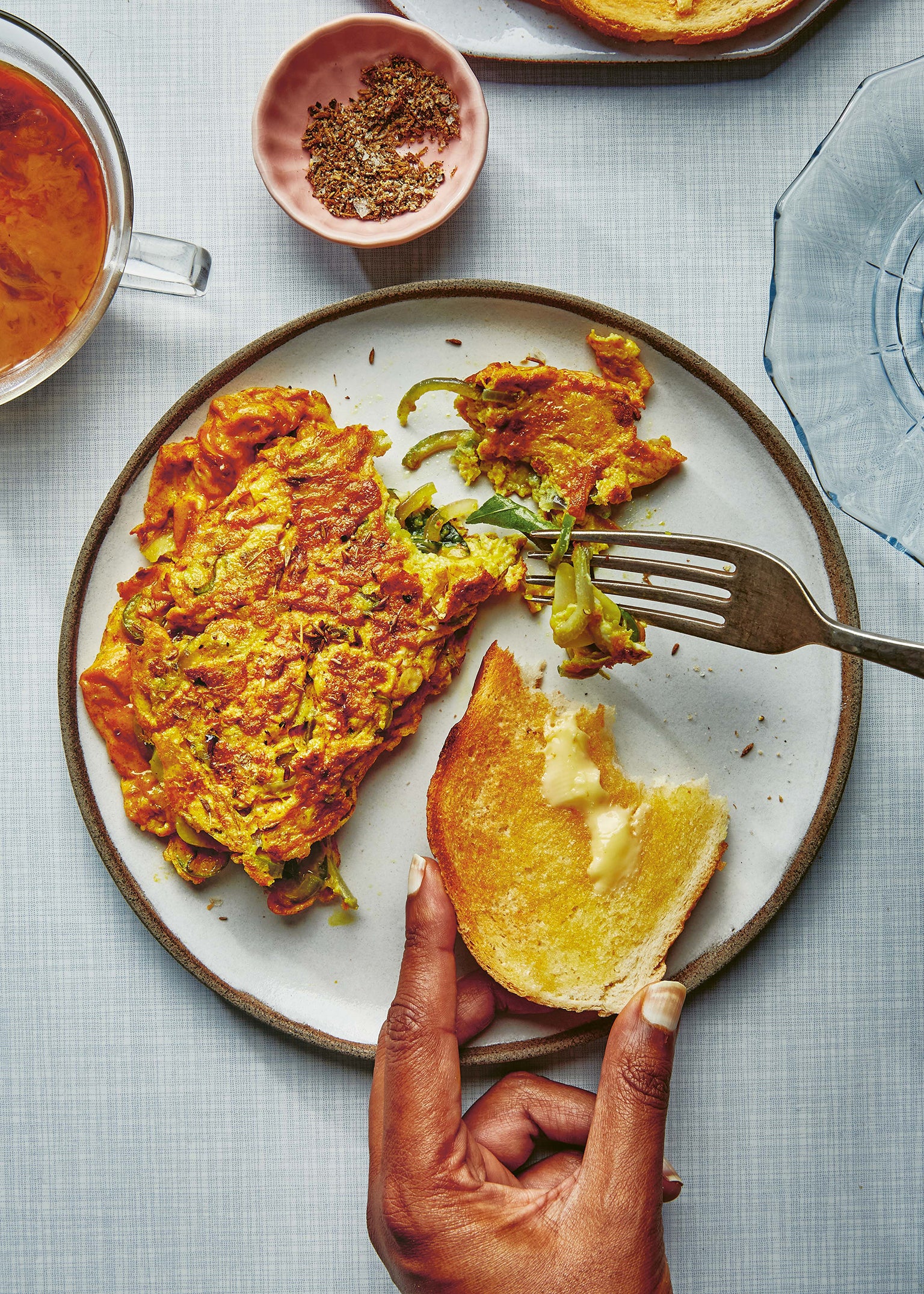
Combining Javanese, Malay, Indian, Arab, Portuguese, Dutch and British influences, the food of Sri Lanka is unique, spicy, fresh and often vegan-friendly. But it can be intimidating to navigate for newcomers.
Cynthia Shanmugalingam’s debut cookbook Rambutan is an informative retelling of the cuisine through the lens of a British-born immigrant, and is as much a personal essay and travel guide as it is a cookbook. A feast of over 80 simple recipes is accompanied by compelling family anecdotes and stunning candid photography.
From crispy hopper pancakes tp spicy drinking snacks, this exuberant guide is for beginners and experienced cooks alike.
Here’s three sneakpeak recipes to give you a glimpse into the world of Rambutan.
Coconut dal with kale
In war or other times of national crisis, dal is rationed out by the Sri Lankan government as one of life’s essentials. Cooked with lemongrass and, if you can get it, pandan leaf (which adds a warm, vanilla flavour) as well as coconut milk, turmeric, curry leaves, garlic and lime, this dal is distinctively light and restorative, and is worlds away from its Indian counterparts like black dal makhani made with cream, or tarka dal made with butter. There is no other dal quite like it, and I encourage you to try adding roasted squash, roasted pumpkin or roasted sweet potato. This one is one of the ways my mum would cook it when she was too short on time to make a separate kale curry. She’d simply stir the leaves in very close to the end of cooking so they retained their bright green flavour and nutrients.
Serves: 4
Ingredients:
For the dal:
300g red split lentils or toor lentils
3 garlic cloves, peeled and halved lengthways
1 lemongrass stalk, bruised
1½ tsp salt
½ tsp SL curry powder
Optional: 4cm piece of pandan leaf
1½ tsp ground turmeric
100ml coconut milk
3-4 small handfuls of kale (about 200g)
Optional: 1 tsp chilli flakes
For the temper:
1 tbsp coconut or vegetable oil
1 small red onion, peeled and finely sliced
½ tsp mustard seeds
½ tsp cumin seeds
10 fresh curry leaves
½ lime
Method:
1. Pour the lentils into a saucepan and rinse loosely under the tap then drain well. Cover the lentils with water until they’re submerged by about 5cm. Add all the other dal ingredients except the turmeric, coconut milk and kale and bring to a boil over a medium-high heat.
2. Skim off any scum and turn the heat down, so the lentils are simmering. Add the turmeric and simmer for 12-15 minutes until the lentils are tender. There’s no need to stir here, you can basically forget about them except to check they’re not bubbling too vigorously.
3. Drain off about 80 per cent of the liquid. You don’t want it to be too wet and soupy because you’re adding coconut milk later.
4. Stir in coconut milk and kale and allow to simmer gently for 2-3 minutes until the kale is bright green. Take out a little kale to try; it shouldn’t taste raw but should be soft with a firm bite. Remove from the heat and transfer to your serving bowl.
5. In a small frying pan, make the temper. Heat the oil on a medium-high heat (careful, it will splutter a little). When hot, add the onion and cook, stirring occasionally for 3-5 minutes until it starts to turn golden brown. Add the mustard seeds, cumin seeds and curry leaves and cook for a couple of minutes until the curry leaves are bright green. Be careful not to burn the spices!
6. Pour the whole temper, oil included, onto the cooked dal. Squeeze lime over it and sprinkle over the chilli flakes, if using, just before serving.
Pickled pork curry

This gently spiced pork curry is an homage to an old Burgher recipe from housewives’ favourite, the Ceylon Daily News cookbook. It is sweet and moreish. It works fantastically with pineapple sambol.
Serves: 4
Ingredients:
2 tbsp coconut or vegetable oil
2 onions, peeled and diced
20 fresh curry leaves
4cm fresh root ginger, peeled and sliced
2 garlic cloves, peeled and halved
450g pork ribs or pork shoulder, diced into 2-3cm chunks
2 tbsp pickled pork curry spice mix (see below)
125ml apple cider of white wine vinegar
1 tsp white granulated sugar
2 sticks of lemongrass
Optional: 5cm piece of pandan leaf
1½ tsp salt
50ml coconut milk
For the pickled pork curry spice mix:
2 tsp coriander seeds
1 tsp cumin seeds
5cm stick of cinnamon
½ tsp fenugreek seeds
½ tsp chilli power
Method:
1. Make the spice mix by placing a small dry frying pan over a medium heat. Add all the spices and cook, stirring occasionally for 2-3 minutes, until fragrant. Transfer to a bowl to cool, then blitz in a spice grinder or mini food processor until fine.
2. Place a large saucepan or wok over a medium-high heat, add the oil and fry the diced onions for 4-5 minutes, until soft. Add the curry leaves, ginger and garlic. After 2-3 minutes, when the garlic is starting to brown, add the pork, 2 tablespoons spice mix, the vinegar, sugar, lemongrass and pandan leaf, if using. Pour in enough water to just cover the pork and sprinkle over the salt. Bring to a gentle boil and then turn the heat to low and leave to cook, partially covered with a lid, for 2-3 hours.
3. When the meat is very soft and you can slice a piece with a spoon, stir in the coconut milk and cook through for 3-4 minutes. Taste and if you think it needs it, add a teaspoon more vinegar.
Sri Lankan turmeric omelette

This is a favourite breakfast dish; one my mum cooks when she’s taking orders for breakfast at the weekends from her grandson, Thierry, who may be only six but knows what’s up. You can have it on its own with something fresh like a little dill, lime and watercress salad, perhaps with some soft white bread, too. It’s very easy and quick: just softened onions, spices, a little garlic, curry leaves, turmeric and green chillies. Don’t skimp on seasoning with plenty of salt, black pepper and cumin - an amazing mix called milagai seeraham in Tamil.
Serves: 1-2
Ingredients:
A pinch of cumin seeds
A pinch of black peppercorns
3 large organic or free-range eggs
1 tsp salt, plus more to serve
¾ tsp ground turmeric
2 tbsp coconut or vegetable oil
½ red onion, peeled and finely sliced (or a nice alternative is 2-3 spring onions, chopped into 2cm pieces)
1-2 green chillies, sliced
1 garlic clove, peeled and sliced
7 or 8 fresh curry leaves
Method:
1. For the pepper-cumin salt, toast the cumin seeds and peppercorns together in a small dry frying pan on a medium heat for 1-2 minutes until fragrant. Transfer to a bowl to cool, then blitz in a spice grinder or mini food processor until fine, and keep aside for later.
2. In a bowl, whisk the eggs together with the salt and turmeric until frothy. Set aside.
3. Heat 1 tablespoon oil in a frying pan around 20-25cm wide on a medium heat. Add the onion (or spring onions), green chillies, garlic and curry leaves. Allow to cook, stirring occasionally for 4-5 minutes, so that the onion softens; don’t allow it to crisp, and don’t cook past the point that the chillies and curry leaves are still bright green.
4. Add the remaining tablespoon oil to the pan, wait 30 seconds for the oil to get hot, and then pour in the eggs. Keep cooking on a medium heat and use a spatula to pull the edges in as they set, tilting the pan to spread the uncooked egg around. Continue this motion of pulling the edges in and tilting all around the pan, until the omelette is almost set, which will take around 2-3 minutes.
5. Fold in half and serve, dusting generously with pepper-cumin and a little extra salt.
‘Rambutan: Recipes from Sri Lanka’ by Cynthia Shanmugalingam (published by Bloomsbury, £26) is available now.







